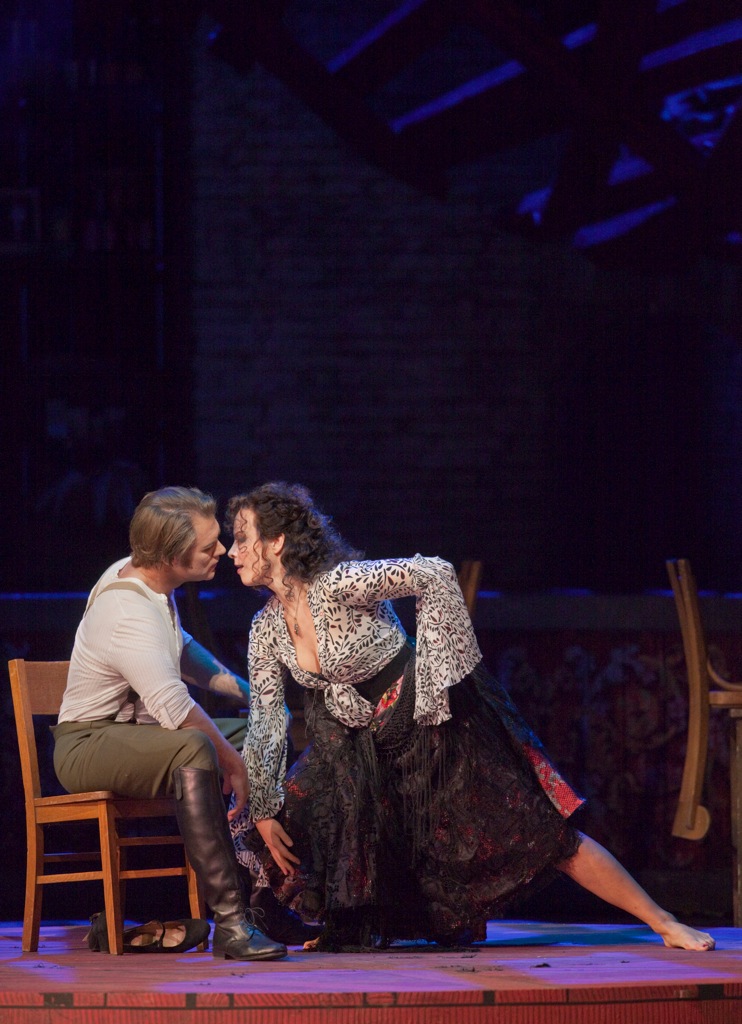Garanča’s sexually charged gypsy lights up the Met’s “Carmen”

Brandon Jovanovich and Elīna Garanča in the Metropolitan Opera production of Bizet's "Carmen." Photo: Ken Howard/Metropolitan Opera.
Last New Year’s Eve the Metropolitan Opera introduced a gripping new production of Carmen, which, it is safe to say, Met audiences will be seeing a lot of in the coming years. It entered the current season’s repertoire Thursday night for the first of 13 performances with last season’s star, Elīna Garanča, once again exerting a fatal attraction as the sexually charged gypsy, but with new singers in two other principal roles and a new conductor, Edward Gardner, in his debut with the company.
Richard Eyre’s production is updated to the time of the Spanish Civil War, but it’s easy to lose sight of this—at least until men in black business suits show up in the pre-bullfight procession of Act 4. Eyre’s direction, which is true to the work yet imaginative in details, keeps the focus squarely on the disintegrating relationship between Carmen and her obsessed admirer, the brigadier Don José, a situation aggravated by her newfound infatuation with the toreador Escamillo.
Rob Howell’s sets, which consist largely of decaying structures that foreshadow the bullring of the final act, are effective too, despite the confusing layout of Act 1. A brick ruin in a circular shape is bordered by a cyclone fence, with soldiers stationed on the other side. Yet the only way to enter their fenced-in quarters is apparently from within the ruin. Furthermore, the women who work in a cigarette factory make their entrances from an opening in the stage floor, as if the factory were underground.
But these issues recede into insignificance once Garanča climbs onto the stage. As with Anne Sofie von Otter, the Swedish mezzo who triumphed as Carmen at Glyndebourne and Santa Fe a few years ago, some might have thought that Garanča, a blonde beauty from the Baltics (though sporting brunette curls here), might be a bit cool of temperament for the role. She handily proves them wrong. Hers is a slightly lighter voiced Carmen than Met audiences are used to, but she turns that to her advantage and her tone is far more alluring than most. The lower register, for instance, projects tellingly without any undue heaviness. And from the beginning, as she washes her factory smock while singing the Habanera, Garanča is a riveting presence. Her Carmen takes a place among the best.
Apart from Garanča, the evening’s finest singing came from Nicole Cabell in the role of José’s hometown sweetheart Micaëla. Cabell’s consistently well-rounded, glowingly resonant tone reminded me of Anna Netrebko’s Micaëla at the Mariinsky Theater early in her career. And Cabell invested the big aria with a due sense of foreboding. Also appearing in a role for the first time with the company, John Relyea cut an amiable figure as Escamillo. His bass-baritone has the requisite range for the role but on this occasion tended to sound raspy.
The rising tenor Brandon Jovanovich, who made his Met debut as Don José last season, again brings a virile, well-formed tenor and keen dramatic instincts to the role. Eyre’s staging makes one constantly aware of José’s interior unraveling by keeping him prominently onstage during moments such as Carmen’s Card Song. Yet other tenors have conveyed José’s sense of despair more forcefully, and Jovanovich’s voice sometimes sounds a little fluttery.
Conductor Gardner, who is music director of the English National Opera, presides over an assured, rhythmically vital account of the score that is quite traditional in its orientation.
Carmen runs through Dec 9, then returns for three more performances (Jan. 5-13). metoperafamily.org